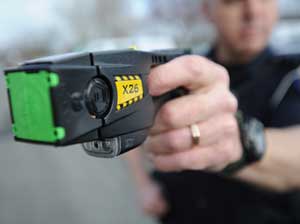Conducted Energy Weapon Operator Training (British Columbia)

Price
$35.00
Free to all BC Police Officers
Content Provider:
BC Ministry of Justice
Tagged Categories:
- Certification/Recertification
- Officer Weapon Handling
Language
En
Length
3 Hour(s)
Release Date
February 2020
Revision Date
April 2024
This course has been developed specifically for officers in British Columbia (BC) and is consistent with the BC Provincial Policing Standards. Access for other interested parties will be determined on a case-by-case basis. Please contact CPKN’s Support Desk for details.
Conducted energy weapons (CEW) are widely used by law enforcement to gain control of subjects in potentially violent situations. However, the use of CEWs is not without risk. The 2007 tragedy involving Robert Dziekanski precipitated a comprehensive examination of the use of CEWs. As a result of that review, the Braidwood Commission made numerous recommendations for the appropriate use of CEWs in the province of BC, including the implementation of Standards relating to CEW operator training.
Conducted Energy Weapon Operator Training (British Columbia) is designed to ensure police officers can safely use a CEW and can articulate the legal, technical, medical, and accountability requirements for use of a CEW. The content of this course is consistent with the BC Provincial Policing Standards and is mandatory for all police officers who operate CEWs in that province.
Learning Objectives
- Explain the purpose of the BC Provincial Policing Standards pertaining to CEWs.
- Explain the CEW operator certification, recertification requirements, and additional requirements for CEW Operator certification.
- Describe a CEW, the approved CEWs in BC, and the three modes that they operate in.
- Compare and contrast pain compliance and neuromuscular incapacitation.
- Explain the National Use of Force Framework/Incident Management Intervention Model.
- Describe response options and apply them in practical terms.
- Explain the bodily harm threshold for CEW use and apply them in practical terms.
- Explain some of the federal statutes pertaining to use of force – Criminal Code (CC).
- Explain the BC Police Act.
- Identify your police agency operational policy.
- Explain civil liability, public accountability, and professional reputation.
- Explain and apply the BC Provincial Policing Standards – CEW Threshold and Circumstances of Use.
- Identify the CEW you will be using in the field.
- Explain probe spread and preferred target zones.
- Explain how to handle CEW cartridges (loading and unloading).
- Explain the role of automated external defibrillators (AEDs).
- Explain medically high-risk CEW discharges and medical considerations if physiological effects/injuries occur.
- Define Emotionally Disturbed Persons.
- Define key words regarding CEW incidents.
- Explain the BC Provincial Policing Standards – Reporting and Investigation Following the Use of Force and the BC Provincial Policing Standards – Internal Conducted Energy Weapon (CEW) Controls and Monitoring.
- Explain the Subject Behaviour Officer Response reporting.
- Explain CEW Operator documentation and downloading responsibilities.
Target Audience
Sworn Police, Government and Other First RespondersPre-Requisite
To receive CEW Operator Certification in the province of BC, police officers must successfully complete the online BC Conducted Energy Weapon Operator Training or another provincially-approved online CEW operator training course, as well as a provincially-approved practical, hands-on training and final assessment. The practical training for BC police must conform to provincially-approved Practical Training Outlines and be facilitated by instructors certified in BC’s Standardized Use of Force Instructor Course (SUFIC) or other provincially-approved training for use-of-force instructors.Annual re-certification is required for CEW operators in BC pursuant to the BC Provincial Policing Standards for CEW Operator Training.
